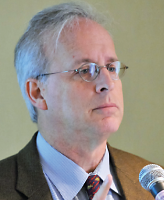Perhaps uniquely among medical specialties, “psychiatry is especially engaged with and concerned with the public world, with public service, and with government,” said Kenneth Thompson, M.D., at the APA Institute on Psychiatric Services in San Francisco last October.
“We need to develop an agenda and make it clearer, because at the present time, in many ways, we’re not participating at the level we need to in policy formation and development,” said Thompson, chief medical officer of Recovery Innovations in Phoenix, and an associate professor of psychiatry and public health at the University of Pittsburgh and the Western Psychiatric Institute and Clinic. He also served as the medical director of the Center for Mental Health Services (CMHS) in the Substance Abuse and Mental Health Services Administration (SAMHSA) from 2007 to 2010.
A public role for psychiatry is critical because the origins and impact of mental disorders extend beyond the domain of the individual.
“Many psychiatric challenges start in early youth and are sufficiently disabling that patients can’t generate their own livelihood and often become dependent on public resources,” said Thompson.
He discovered his interest in community psychiatry early on. After medical school, he joined with other residents at Jacobi Hospital in the Bronx who wanted more engagement with the surrounding community to develop, outside the curriculum, an outreach program at a local homeless shelter.
While on the faculty at the University of Pittsburgh, Thompson received a Soros Fellowship to look at what happens when the underlying economic structure—like Pittsburgh’s steel mills—disappears.
“The ways society is organized and how resources are distributed are very much related to what happens psychiatrically,” he said.
Later, when he was selected to close down Harrisburg State Hospital in central Pennsylvania, he learned how that decision had implications for both the people in the hospitals and the communities that surround them.
Thompson went to SAMHSA, persuaded by CMHS Director A. Kathryn Power, M.Ed., that psychiatry belonged in the organization. He worked there to transform mental health services, guided by the recovery model. He also sought to enhance the dialogue between the science side of government, such as the National Institute of Mental Health, and the services side, represented by CMHS, SAMHSA, and the Health Resources and Services Administration.
“I tried then to get the government to respond to an ongoing mental health emergency—namely, the economy,” he said. “The mental health system is based on state resources, but just when we had our greatest need, our resources started going down.”
He remains concerned because the medical director’s slot at SAMHSA is unfilled.
Thompson offered several ideas for a new public-service psychiatry agenda.
“First of all, we need a vision that calls for more than just more treatment,” he said. “We’ve been saying: We want more money to do more treatment. That is not what the public wants; it wants to be healthy. So how do we produce a healthier nation?”
A good start would ensure that the patient’s experience in the clinic is always positive. No matter who they are or who pays for their care, all patients want to be respected and should be treated that way, he said.
Then, the goal of mental health treatment should be not just to make disease go away but to ensure that patients have the opportunity to live, have friends, work, and live decent lives like everyone else.
To that end, Thompson said he has long advocated implementing recovery-oriented services, with shared decision making, optimized medication, peer support, and recovery action plans.
“We should reconcile evidence-based practice with practice-based evidence,” he said. “How can we fit the patients’ goals with our goals?”
To demonstrate progress to policymakers, he suggested that more could be done to quantify outcomes—such as disability rates or numbers of patients going on and off Supplemental Security Income, for example.
Primary care, he said, is another key to better access to psychiatric help in public services.
“We can’t have good mental health care without good primary care capacity,” he said. Psychiatrists “need to figure out how we’re going to interact with the rest of the medical world, particularly around the elaboration of primary care health services and our role in those services.”
Psychiatry could also lead the way in primary prevention, he said. “Eliminating child poverty, the most important social indictor for mental health, would make a significant change,” he emphasized.
Talking more consistently to members of Congress would help as well.
“Congress is the most important body we could influence,” he said. “SAMHSA spends at Congress’s direction on specific issues, and if you’re not influencing Congress, you’re not influencing SAMHSA.”
Thompson said, “We need to develop an agenda and make it clearer, because at the present time, in many ways, we’re not participating at the level we need to especially in policy formation and development.”


